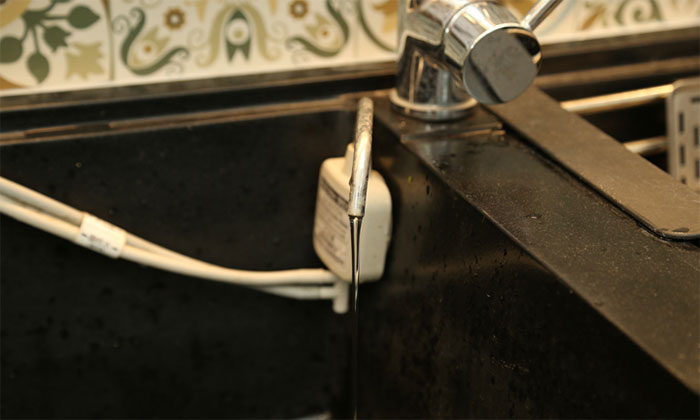Why is water wet, and fire hot?
This may be a silly question but why is the water wet? All previous answers about water did not explain why the water was wet. We simply understand that water is naturally wet.
Similarly, we also obviously know that fire generates heat. But what makes a fire hot?
According to the University of California website, Santa Barbara (UCSB), is a liquid, water does not get wet itself, but can make other solid materials wet.
Humidity is the ability of a liquid to attach to a solid surface, so when we say that something is wet, it means that the liquid is attached to the surface of the material.
Whether a body is wet or dry depends on the balance between cohesive and cohesive forces . Understandably, the bonding force is the same two things stick together, and the adhesive force is two different things stick together.

Water does not get wet on its own but may cause other solid materials to get wet.
The binding force is the gravitational force in a liquid that causes molecules in a liquid "like" to stick together. The bonding force is also related to surface tension. If the binding forces are very strong, the distance between molecules of the liquid is very close and they will not spread much on the surface of an object.
In contrast, the adhesive force is the gravitational force between a liquid and a material surface. If the adhesive force is strong, the liquid will try and spread to the surface as much as possible. So, how wet the surface depends on the balance between these two forces. If the cohesive force (liquid-solid) is greater than the cohesive force (liquid-liquid), we say that the material is wet and the fluid tends to spread out to maximize contact with the surface. On the other hand, if the cohesive force (liquid-solid) is smaller than the cohesive force (liquid-liquid), we say that the material is dry and the liquid tends to agglomerate into a spherical droplet and try to minimize contact with surface.
Water actually has quite a high binding force due to hydrogen bonding, and therefore it does not wet the surface as well as some liquids such as acetone or alcohol. However, water wets certain surfaces such as glass for example. Adding detergent to water can make the water wetter because of its reduced binding force. Water-resistant materials such as Gore-tex fabrics are made from hydrophobic (impermeable) materials and therefore the bonding force in water (liquid-liquid) is much stronger than that of adhesive (solid-liquid) and water. tendency to granulate on the outside of the material and make it always dry.
That is also the reason to explain why it is also liquid, but the degree of wetting between water, cooking oil, milk . is different. And if your children ask you why water is wet, don't tell them because water is liquid. Because there are liquids that do not get wet like mercury.
So why is fire so hot?

The fire is hot because the thermal energy (heat) is released.
According to Thoght.co, the fire is hot because the heat (heat) energy is released when the chemical bond is broken and formed during the burning process. Burning turns fuel and oxygen into carbon dioxide and water. In order for the reaction to take place, it is necessary to have the energy to break the bond in the fuel and between the oxygen atoms, but the energy is released more when the atoms are bound together into carbon dioxide and water.
Fuel + Oxygen + Energy → Carbon Dioxide + Water + More energy
Both light and heat are released as energy. The fire is tangible evidence of this energy. The flames consist mostly of hot gas. Embers glow because material is hot enough to emit incandescent light (like a stove burner), while flames emit light from ionized gases (like fluorescent light bulbs). Fireplace lighting is a clear sign of the combustion reaction, but the thermal energy (heat) can also be invisible.
Summary: The fire is hot because the energy stored in the fuel is released suddenly . The energy required to initiate a chemical reaction is much less than the energy released.
- Video: Technology turns water into fire
- Video: How to create fire from lemon extremely unique
- Video: Meaning of different colors on fire hydrants
- There is a beautiful fire bird swimming in the water
- Teamwork helps fire ants to die in floods
- Water: Something you never expected could burn a match
- High-altitude fire hoses of nearly 600m sweep through the American town
- Fire cannons turn into vortex columns when touching the river
- How was the old man against 'Ms. fire'?
- Things to know about the Fire - The difference between people and things
- Correct response when suddenly caught fire
- The mechanism of 'fire hose'
 'Fine laughs' - Scary and painful torture in ancient times
'Fine laughs' - Scary and painful torture in ancient times The sequence of numbers 142857 of the Egyptian pyramids is known as the strangest number in the world - Why?
The sequence of numbers 142857 of the Egyptian pyramids is known as the strangest number in the world - Why? History of the iron
History of the iron What is alum?
What is alum?